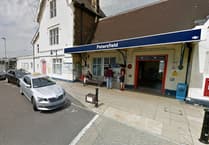Alton Abbey is a flint and brick little gem settled into the leafy margins of the village of Beech; it has an interesting history.
Noted for its beauty and tranquillity, it has been described as “the best-kept secret in the Church of England”.
As will become apparent, secrecy is a bit of a theme as far as the abbey is concerned.
Founded originally around 1884 as the Society of St Paul, it aspired to give solace and shelter to destitute merchant seamen.
In 1982 there was an ecclesiastical rebranding exercise as members swapped their allegiance from St Paul to St Benedict.
At the outbreak of the First World War in 1914, German merchant ships in British ports were impounded and their crews interned. Some of those crews ended up at the abbey working on the surrounding farmland, guarded by troops of local Scouts.
The cemetery at the abbey is testament to the German sailors who remained there long after hostilities ceased.
The patriotic imperative of serving the country’s war effort led to community member John Lott being released from his vows to join the regiment of Royal Engineers in France.
Known as ‘the monk who went to war’, he was badly wounded during an effort to rescue other members of his unit who had come under enemy artillery fire.
He was awarded the Military Cross for his bravery but died in a field hospital on May 21, 1917, and was buried in the military cemetery at Peronne. He’s commemorated at the abbey with a stone memorial and his name also appears on Alton’s own war memorial.
After the war, the abbey’s work with seafarers was eventually outsourced, while the monks concentrated on manufacturing incense for other religious bodies as well as running a busy retreat and guest house, providing temporary accommodation and meals while also catering for their guests’ spiritual needs.
The community has never been large and without new members prepared to take on the strictures of life as a monk, numbers eventually dwindled, and in 2020 just five monks remained.
I understand that number now stands at two elderly incumbents.
In early 2020 the abbey went into Covid lockdown, closed its doors on the instruction of the visiting bishop, and they have not re-opened.
Currently, the abbey no longer functions as a religious establishment.
With the remaining elderly monks scheduled to be rehoused, the abbey, along with its guest house facilities, remains empty, the doors locked and, for all intents and purposes, abandoned.
The abbey is officially designated as a charity and as such is governed by a board of trustees who make decisions about the running of the abbey and now, it appears, its future.
Of the nine male trustees, none is, as far as I can tell, local to this area and unlikely to appreciate the local impact of the abbey’s closure.
With the one or two exceptions, the trustees hold varying ecclesiastical ranks while the chair of the trustees is a tax accountant from distant Somerset.
It should be recognised that, despite their apparent rudimentary grasp of the concept of empathy and humanitarian aid, the trustees have obligations towards the monks and the assets that constitute the Order of St Benedict at Alton Abbey (those assets approach £4million, by the way).
They appear to be completely unaccountable to anyone except the Charity Commission, under whose authority they operate.
It’s been clear for some time that we have a severe housing crisis in East Hampshire. This is impacting on our Ukrainian refugee population attempting to find somewhere to live as their hosting arrangements with local families come to a natural conclusion.
Commercial rentals are way out of reach and the district council is struggling to identify appropriate alternative accommodation.
For months I’ve been trying to persuade the trustees of Alton Abbey to open the Abbey’s doors to our Ukrainian families who have had to flee artillery, bombing and missile attacks on their homes and civilian infrastructure.
They are estranged from their previous lives in Ukraine and quite desperate to find somewhere safe to live in the environs of Alton, a town that has enthusiastically embraced them. Most have found work here and their children attend local schools.
My pitch to the trustees is simple: the facility they oversee is currently redundant but perfectly suited to be temporarily repurposed to take in Ukrainian refugee families seeking a solution to their accommodation problems.
Those Ukrainian families have successfully integrated into Alton and have become an asset to our community.
There’s every chance that, given the opportunity, they would similarly breathe life back into the abbey which historically was set up for the very purpose of offering sanctuary to the distressed and dispossessed.
When the ‘hotel’ aspect of the abbey was functioning, there was ample accommodation, a commercially fitted out kitchen, dining room and leisure facilities complemented by extensive grounds and (currently overgrown) vegetable gardens – a veritable haven and sanctuary for refugees seeking some peace and stability.
I’ve pursued all the arguments, both ecclesiastical and humanitarian, with the chair of trustees in the hope it might encourage a more enlightened and compassionate approach to our refugee dilemma.
With episodic handwringing and assurances about how much he ‘sympathises’ with the plight of Ukrainians, the chair continues to dance elegantly on the head of a pin while coming up with serial excuses why everything is just too difficult, too impossible to contemplate.
He wasn’t going to let Ukrainians or anybody else into the abbey – and furthermore, he wasn’t going to tell us why!
Offers from a local solicitor to sweeten the deal by drawing up the necessary legal agreements free of charge were rebuffed by the trustees, as was the possibility of seed funding from the district council.
That was supposed to be the end of the matter.
Enter the bishops!
It took me a while, wading through a fog of obfuscation and blind alleys, to discover that, while the abbey resides in the diocese of Winchester, their bishop plays no role whatsoever in the abbey’s affairs.
With the assistance of the affable bishop’s chaplain, I was eventually able to alight on the bishop of Chichester as being the elusive ‘episcopal visitor’ or ‘flying bishop’ to the religious community at the abbey.
According to the guidelines laid down by the Church of England, every community must have an episcopal visitor or guardian who is the guarantor to the Church at large of the particular order’s sound administration.
The bishop’s role is important as it was he – or his predecessors – who, in 2020, issued the original instruction to the abbey to close its doors. The present incumbent bishop would need to rescind that instruction if the trustees were ever to consider opening the abbey to refugees.
Aha!, I thought, now we’re getting somewhere.
However, I hadn’t reckoned on the bishop’s gatekeeper, his chief of staff. Unfailingly polite, this gentleman seemed to have some difficulty articulating the exact role played by his bishop in relation to the abbey.
We got into a bit of a polite scrap over whether he was being entirely transparent about his boss’ role. In any event, he was definitely not keen to enter a detailed dialogue about the matter.
Cue the sound of another door closing!
It was clear I was on the wrong end of an ecclesiastical closing of ranks and was entering the bewildering world of clerics and an impenetrable merry-go-round of obdurate trustees and unhelpful bishops.
Somewhat naively, I thought the ecclesiastical world was full of good people practising what they preach, doing good deeds by aligning themselves with the scriptures – but above all, mindful of their humanitarian responsibilities to those less fortunate and needy.
Instead, it seems that world prefers to shy away from scrutiny and accountability and tolerates not compassion and altruism, but instead a polite sort of moral bankruptcy.
What I’ve experienced over the past few months is a tragi-comic blend of Yes Minister and All Gas & Gaiters. It’s been quite dispiriting, not to say shocking.
In this closeted ecclesiastical world with its strange traditions and obscure governance, people who should know better are behaving very poorly indeed.
Justin Welby, the occasionally outspoken Archbishop of Canterbury, in his recent speech to the House of Lords about the Illegal Migration Bill, concluded by reminding us that “Jesus calls us to welcome the stranger. That call has been part of the history and culture in this country for centuries”.
The casual indifference displayed by the abbey’s trustees, slamming the abbey doors in the faces of refugees, is, by any measure, grotesque.
According to a recent report by the United Nations refugee agency, the war in Ukraine has driven the largest annual increase of people forcibly displaced by persecution, conflict, violence and human rights violations in decades.
At the end of 2022, “11.6 million Ukrainians remained displaced, including 5.9 million within their country, and 5.7 million who fled to neighbouring countries,” creating the fastest displacement crisis, and one of the largest, since the Second World War.
The recent breaching of the Kakhovka hydroelectric dam in Ukraine has left tens of thousands homeless and without drinking water.
A recent communication from a British couple who have been providing humanitarian aid in the Kherson region is an insight into the scale of this disaster.
They say: “So, as of today, we now have 10,000 people in one village relying on just us two for drinking water.
“This is on top of the 11 villages we were supplying before the dam was hit.
“The people there are desperate and it’s painful to watch. People were in tears when we turned up today.
“Even a child hugged both of us, which is a first – no child has ever thanked us for water before.”
It’s quite possible that some of these families may well be coming our way and joining the Ukrainian community here.
If, reading this, you are in a position to be able to help those whose innocent lives have been torn apart by war, I implore you to act now.
Similarly, if you are a trustee of the abbey, consider choosing compassion over silence and secrecy.
If you are a member of the Church of England with influence that will reopen the abbey doors, remember the true Christian purpose of your calling and act now.
Brother John Lott MC, that founding figure in the building of the abbey who truly understood the horrors of war, would expect nothing less.




